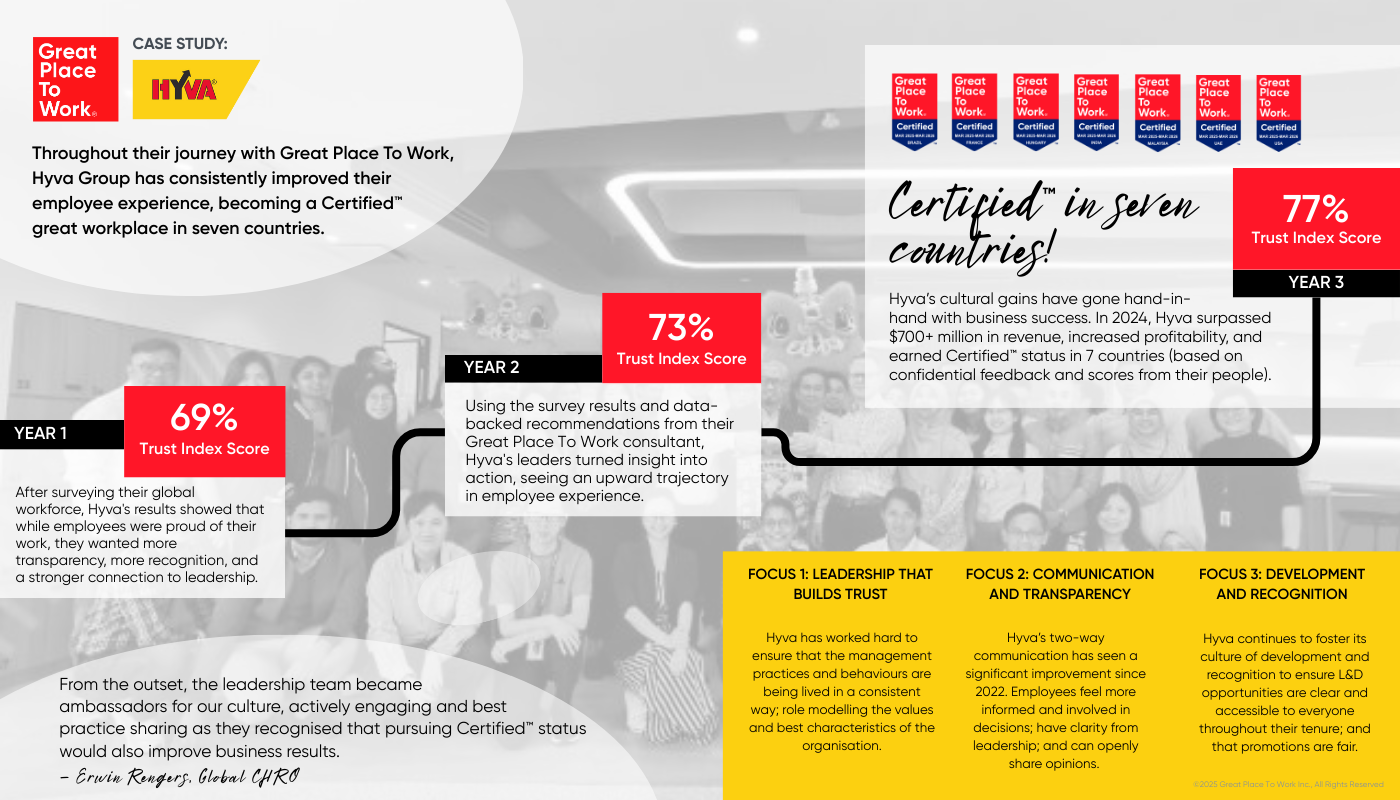In 2020, only 44% of employees reported feeling comfortable to talk to their line manager about their mental health.
Below we share 5 key questions line managers can ask themselves right now to provide better mental wellbeing support for their colleagues.
How line managers impact employee mental health
The raw, vulnerable business of supporting direct reports with personal wellbeing and mental health is one where many people managers still feel entirely out of their depth.
Knowing how to support each individual largely depends on the employee’s readiness to share their personal issues with their line manager – and sadly, most remain reluctant to open up.
An interesting contradiction was found in our own Wellbeing Index data which gave us insight into the relationships between UK employees and their line managers:
On average, 86% of UK employees state they receive empathy and support from their managers when needed, yet only 75% would actually feel comfortable speaking up about personal wellbeing issues affecting them at work.
So why the gap?
Well, no matter how close a bond exists between manager and employee, opening up about personal issues (particularly where these concern mental health) is in a league of its own, requiring specialist skills and considerations.
An increase in remote working, and more businesses opting for hybrid work environments, has also complicated matters as virtual landscapes limit our opportunities for spontaneous interaction and ability to notice a change in colleagues’ behaviour, mood, and so on.
The good news is, compassion, listening and being available are all basic skills that can greatly improve your interpersonal relationships at work – and build trust to help employees feel more comfortable to share.
So rather than deep diving into epidemiology textbooks or memorising the clinical symptoms of every mental illness, take a moment to ask yourself these 5 key questions:
Q1 – Do I take good enough care of myself to be able to support my team?
Caring for others starts with caring for yourself.
Although consistently putting others’ needs in front of one’s own might seem like the ultimate act of selflessness, it is simply not a sustainable strategy, nor in anyone’s best interests.
We keep hearing the ‘you can’t pour from an empty cup’ mantra for a reason. It’s the same reason that adult flight passengers are told to put on their own oxygen masks first before helping others.
Self-care is critical enough in its own right, but where others need to be supported, mental and emotional reserves must be built up strong enough to draw from without the risk of serious exhaustion.
As to how these reserves are best reinforced, it varies from individual to individual. A good starting point is to think about:
- What activities or moments usually best ‘recharge your batteries’? Whether it’s exercise, meditation, socialising, music or writing – there’s something for all of us.
- Are there any other activities or habits that tend to deplete your energy, and how can you avoid or minimise these?
This sort of mental decluttering exercise can be done at various points throughout the year as a self check-in on your resilience.

NEW! Wellbeing for Managers Masterclass
Get the skills and tools to support the mental wellbeing of your direct reports.
Q2 – What would I do if I were currently struggling with a mental health issue at work?
The sad truth is, despite all the progress we’ve witnessed in recent years, mental health issues continue to carry stigma, and can be incredibly difficult to talk about.
It’s easy to say retrospectively “Well, why didn’t you just say something?” after learning of a team member’s struggle with depression, for example. But when learning about mental health issues, take a moment to genuinely consider how you would act if crippled by an overwhelming sense of anxiety, low mood or mental fatigue – without a clear reason or diagnosis.
As a manager, let self-awareness and careful empathy be your guiding force and work to exhibit the types of behaviours and attitudes that you would need to feel comfortable with being vulnerable around others.
Q3 – Are my check-ins with direct reports happening frequently enough to spot signs of a potential issue, and do I know what those signs might be?
Alongside self-care and self-awareness, logistics are hugely important.
Line managers tend to be valuable guardians of workplace mental health precisely because of their frequent formal and informal contact with team members, offering ample opportunity to spot and respond to potential red flags.
It’s therefore incredibly important to hold onto this in practice, ensuring that regular one-to-one meetings, as well as more informal spontaneous check-ins, actually occur, rather than just brushing these aside when more urgent deliverables get in the way.
Managers also need to be careful not to equate team meetings or group catch-ups with individual quality time (‘Oh, they seemed completely fine in our team meeting, we can just skip our 1-2-1’), as group sessions rarely offer meaningful opportunities to disclose anything more personal.
This is where some basic knowledge of signs and symptoms of potential mental health issues is useful. In a nutshell, any uncharacteristic behaviours for a given individual should prompt managers to dig a little bit deeper into how people are feeling and coping.
Q4 – Have I forged a bond of trust, openness and psychological safety that would make my direct reports willing to open up to me?
With the right logistics in place, it’s time to think about the attitudes and behaviour that you, as a team leader, convey to your team.
Leaders and managers are widely regarded as the most prominent carriers of culture within organisations, whether this is consciously acknowledged or not.
Think about the extent to which you share personal experiences with your team, particularly relating to times of struggle or challenge, as this may well be the single biggest factor determining whether they do the same.
Observation and role-modelling are hugely powerful processes, so do keep asking yourself what kinds of messages you impart onto your team via your words and actions.
Finally, trust takes a long time to build and only seconds to break. Endeavour to enhance a sense of trust at the foundation of your relationship with team members – through intentional and continuous two-way communication, always keeping your promises, and aligning actions with words.
Q5 – Would I know how to act and what to say in a difficult conversation about my team member’s mental health?
Naturally, asking direct reports for openness about their mental health requires you to be ready to deal with such conversations.
Whilst a vast literature exists on exactly what to say and what not to say, attempting to memorise such protocols to deploy in emotionally charged situations seems largely unrealistic, even unhelpful if this comes across too rigidly.
Compassion is always key in such moments:
- THANK the person for choosing to open up to you;
- LISTEN actively to what they have to say without judgement or interruption;
- And DEMONSTRATE CARE and concern for them.
Remember also that you are their line manager – not a psychiatrist, not a therapist, nor their friend primarily – so avoid getting too implicated by giving diagnoses, advice or otherwise making personal promises you can’t keep down the line.
Having some internal and external resources to share comes in handy here, so have a think in advance about where individuals can seek further, or professional, help.
Also make sure to fully understand the implications of confidentiality, including certain circumstances (risking harm) in which this needs widening.
How UK’s Best Workplaces™ Support Mental Wellbeing
For people managers without any formal training or life experience with mental health issues or supporting those affected, asking the above five questions is a useful starting point – and indeed something we would urge all those with people management responsibilities to do.
At the end of the day, it’s not about clinical diagnostics or the ability to give therapeutic advice, but about being human together and creating a safe space for vulnerability and sharing.
Having this psychological safety net built up amongst your team members will ensure that if problems occur, as they inevitably will through the ups and down of life, your employees hopefully won’t hesitate to mention them early on, saving time, money and unnecessary suffering – for everyone.
Reaching Out
 For world mental health awareness week, Sobi UK & Republic of Ireland launched their #bekind postcard initiative for employees to send a nice comment, thank you or recognition to a colleague.
For world mental health awareness week, Sobi UK & Republic of Ireland launched their #bekind postcard initiative for employees to send a nice comment, thank you or recognition to a colleague.
As a people manager, you can easily replicate this idea for your own team by sending a short handwritten note to direct reports, letting them know you are thinking of them and available to anyone who may need a listening ear during tough times.
 In 2020, the HR team at Insight Direct (UK) Ltd worked with managers to create a list of their most vulnerable employees – whether they were living alone, pregnant, had long-term physical health conditions, were suffering from mental illness, or simply in the older age category.
In 2020, the HR team at Insight Direct (UK) Ltd worked with managers to create a list of their most vulnerable employees – whether they were living alone, pregnant, had long-term physical health conditions, were suffering from mental illness, or simply in the older age category.
These teammates were contacted regularly to see how they were doing, and were offered a buddy at the start of lockdown as part of the company buddy system in order to support their wellbeing.
If you're really struggling to get your people to open up, or perhaps feel you just don't have the emotional capacity to provide support yourself, a buddy system may provide an ideal solution for you.
And it can be as effective whether your organisation plans to remain in 100% remote working after the pandemic, or shift to a more hybrid or even full-time office environment.
NEW! Wellbeing Masterclass for People Managers
Get all the right tools and skills to support your direct reports in navigating the road back to 'normality'. Available in-person or virtually.
To learn more about our other Employee Wellbeing services, please click here.











